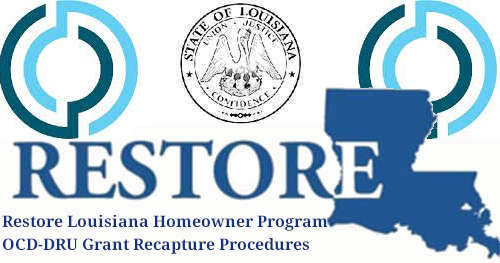By Murray Wennerlund published 3-29-2023 updated 3-29-2023
|
|

By Murray Wennerlund published 9-25-2022 updated 9-29-2022

By Murray Wennerlund published 9-25-2022 updated 9-29-2022
Grant Recapture Procedures - Restore Louisiana Homeowner Program
Regulatory framework:
CDBG regulations [24 CFR 570.502] governing grant administration and OMB cost principles [2 CFR 200.403 (a)] require that payment of Community Development Block Grant – Disaster Recovery (CDBG- DR) funds to beneficiaries be necessary and reasonable and prohibit beneficiaries from retaining excess funds not used for eligible, approved costs. The provision of CDBG-DR funds in excess of what is needed for immediate use is also prohibited [2 CFR 200.305 (b) (1)].
The Robert T. Stafford Disaster Relief and Emergency Assistance Act, (42 U.S.C. 5121–5207), as amended, (Stafford Act), and Federal Register Notice, Vol. 76, No. 221, Wednesday, November 16, 2011 provides that CDBG-DR funding may only be provided to the extent that it does not duplicate funding provided to a beneficiary for the same purpose.
Recapture of funds within the RLHAP will primarily be a function of Louisiana Office of Community Development – Disaster Recovery Unit staff. The role of the program contractor relative to recapture will be limited to the identification of Applicant files that appear to meet the criteria for repayment and transmitting those files to OCD-DRU as detailed in the OCD-DRU Grant Recapture Procedures and other responsibilities as assigned. OCD-DRU may name a designee to perform collections on its behalf.
After the identification of potential for grant recovery, all recovery activities including verification of repayment circumstances and attempts to recapture grant funds will be performed by the Louisiana Office of Community Development or its designee.
The reasons for a partial or full grant recovery include but are not limited to the following:
Identification of Potential Grant Recovery
In the course of implementing and monitoring the RLHAP, applicant files may be identified for potential grant recapture by call center program staff, state staff, or auditors. Files which appear to meet any of the Repayment Circumstances will be marked as Potential Recapture and will be placed on hold so that no additional disbursements are made until a full review of the file is conducted. After the identification of potential for grant recovery, all recovery activities including verification of repayment circumstances and attempts to recapture grant funds will be performed by the Louisiana Office of Community Development or its designee.
Once an applicant file has been identified for potential grant recovery, the file will be assigned a case manager within the Louisiana Office of Community Development. Applicant files referred to the Recapture Team will be assigned a recapture case manager and will receive a full and complete file review to ensure the accuracy of the file. The recapture case manager will document the amount and basis of the recapture and prepare a letter to the applicant informing them of the proceedings. The recapture letter shall contain the reason for the grant recapture and an explanation of the recapture process. The first letter will request a response from the applicant within 30 days. Letters will be mailed to all known addresses listed for an applicant. If no response is received from the applicants’ first letter attempt, a second letter will be mailed and they will have 30 days to respond to the second letter. If both contact attempts fail, applicants file will be moved to collections.
Repayment
After final determination of recapture, the Applicant file will be referred to the Recapture Team for payment. Full repayment in one lump sum is expected, however, applicants may file a hardship request if full payment cannot be made. RLHAP will analyze any applicant claims of financial hardship, and may make limited accommodations in some cases in order to facilitate repayment. Factors that determine the Applicant’s eligibility for a hardship waiver include whether the applicant has the financial resources to repay the award whether the repair of the property was completed whether the Applicant was a victim of contractor fraud and, whether there are other mitigating factors. The Applicant will be notified in writing of the hardship determination, and Applicant shall have thirty 30 days to accept the terms of the hardship determination, which may include a repayment agreement and/or a modified repayment amount. If the Applicant does not accept this determination, the Applicant will be required to repay the full lump sum amount.
RLHAP shall monitor repayments to ensure that Applicants are performing in accordance with the terms of repayment. Should applicants submit a late payment or if a payment is dishonored by the applicant’s financial institution, the Program may apply an appropriate fee to the Applicant’s balance due. RLHAP shall take additional, cost reasonable measures as necessary to collect the repayment amount, including instituting collection proceedings. RLHAP, in its sole discretion, shall institute measures necessary to effectuate repayment from individual program applicants to the extent that amounts are collectable.
Collections
In the event that an Applicant is unresponsive or fails to repay the award after reasonable efforts to contact the Applicant, the Program will evaluate the feasibility of collection efforts and/or litigation. The Program will evaluate the amount of potential recovery as compared to the potential cost of attorney's fees to pursue collection efforts and/or litigation. In the event that the Program determines that the costs of collection/litigation may not justify the potential recovery, the Program will evaluate charge off pursuant to a separate policy. In the event that the cost of collection/litigation are justified by the amount of potential recovery, the matter will be referred to an attorney for the State to initiate collection or litigation proceedings.
Recapture Standard Operating Procedure
Recapture Roles
Process Outline
Communications
Attorney’s\Executive Council
Attorney
Research Resources: